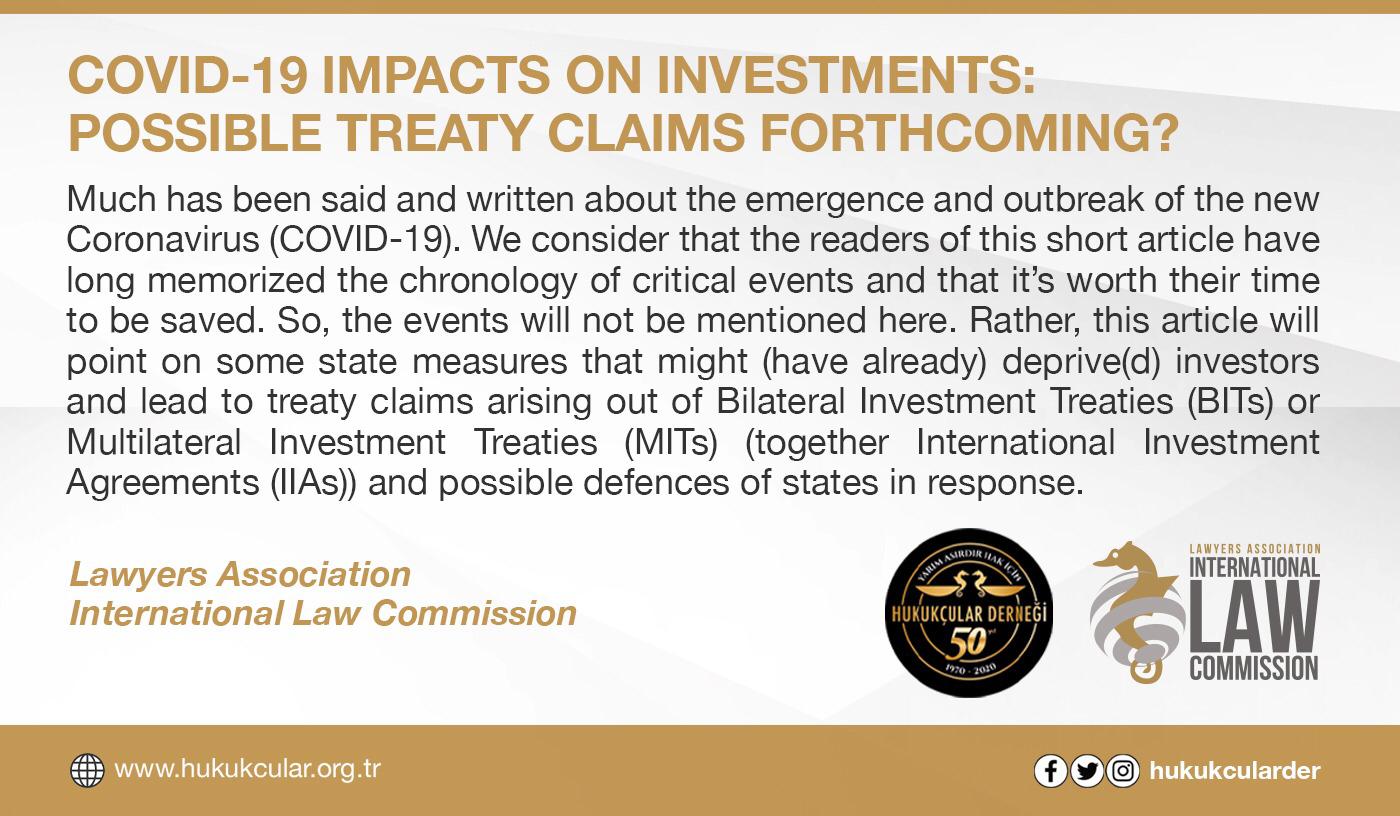1. Introductıon
Much has been said and written about the emergence and outbreak of the new Coronavirus (COVID-19). We consider that the readers of this short article have long memorized the chronology of critical events and that it’s worth their time to be saved[1]. So, the events will not be mentioned here. Rather, this article will point on some state measures that might (have already) deprive(d) investors and lead to treaty claims arising out of Bilateral Investment Treaties (BITs) or Multilateral Investment Treaties (MITs) (together International Investment Agreements (IIAs)) and possible defences of states in response.
2. Emergency Measures ın COVID-19 Tımes
Contagion of the coronavirus out of China lead many states (maybe not some, but at least most states) to engage in emergency safety measures for maintaining public order and health, preventing the spread of the coronavirus and proactively fight the effects of the coronavirus. While these measures help to fight the coronavirus, they brought many sectors to a forced standstill due to imposed long curfews as in the UK, most states of the US (such as California) and Turkey (only weekends) and state of emergency situations such as in Italy and Spain.
Besides the effects on everyday life and general public, there is clear evidence that transnational corporations started to suffer export difficulties and trade restrictions [2] due to the measures. Some of these restrictions may be implemented according to world trade organization rules[3], so “could” be in line of international law standards. Also, travel restrictions, inevitably, have already and will further lead to serious financial and economic problems in the many sectors such as tourism and aviation[4]. It is highly likely that some adopted general measures will be unproportioned and disrupt investments, maybe even cause to cease businesses or will be nationalised, thus giving rise to investment disputes.
For instance, based on the Defense Production Act, which allows the administration to force a company to prioritize the U.S. government over competing orders[5], the United States government ordered the now famous 3M mask manufacturer to stop exporting masks and compel 3M to send the masks to the United States made in factories overseas.
3M is a corporation and registered at the stock. It might have foreign shares and/or foreign control, thus could be an investment under some IIAs. Could the emergency measures lead to expropriation, breach of fair and equitable (FET) standard or full protection and security (FPS) clauses? Or has the measure adopting state a rightful defence under customary international law, such as force majeure or necessity?
It is hard to establish a general principle from this stance, however the most crucial measures could be “inevitability”, “necessity” and “proportionality” tests. In other words, whether the relevant state measure is needed and only this measure is suited for the circumstance. The threshold for a violation has to be determined on a case-by-case analysis.
3. State Measures Leading to Possible Treaty Claıms
So, for a treaty claim under an IIA, first of all there must be an investment by an investor. Without investment/investor, there is no treaty claim. So the basis that classifies the transaction as an investment has to be analysed. Based on the example above, the BIT between Turkey – United States of America dated 1985, defines “shares and stocks” as investments. So a Turkish person who has shares of the 3M company, qualifies as an investor and is a potential claimant against the United States.
It is not enough that the BIT’s scope covers the investor, there must be a breach of the material protections provided to the investors in the BIT. The Turkey-U.S. BIT, among others, includes protections such as National Treatment, Most-Favoured Nation Treatment, FET and FPS.
The president of the U.S. targeted the company via his official Twitter account and threatened it tacitly with sanctions, which lead to decrease in share prices[6]. Shortly, trade and export restrictions followed. Indeed, this act and steps that would deprive the business could lead to a breach of treaty provisions. However, the question remains whether the government has the right to do so, considering the local need for the masks due to the coronavirus.
4. State Defences for Exoneratıon from Lıabılıty
The issue cannot be dealt by just looking at one side of the coin. Consideration must be given to the severe impact of the coronavirus in the U.S. and the duty of the government to maintain public health and order. The Article X of the BIT provides that for the “maintenance of public order” or the “protection of its own essential security interests”, the state may apply measures. Thus, it could be argued, provided the measures are not arbitrary, are necessary and fitting to the circumstance, that there is an exception to the protection standards in the BIT. In case where the BIT does not indicate exceptions for investor protections, states could rely on defences arising out of customary international law, specifically ILC Articles on “Responsibility of States for Internationally Wrongful Acts” dated 2001. According to the articles 23-25, states could be discharged from their breaches in case of force majeure, distress or necessity circumstances.
4.1. Force Majeure (Art. 23)
Force Majeure (FM) “is the occurrence of an irresistible force or of an unforeseen event, beyond the control of the State, making it materially impossible in the circumstances to perform the obligation.” Thus, if there is an 1) unforeseeable event 2) beyond the control of the state which makes it 3) materially “impossible” to perform the treaty obligation arising out of the BIT, then the state could be exempted from liability in a potential investor claim. However, if the state led to the situation which it invokes as force majeure or the state has assumed the risk of that situation, force majeure cannot be relied on to escape breach of a material obligation in the BIT.
Even the COVID-19 is an unforeseeable event beyond the control of the state, it should not free the state from breach of every single treaty obligation, since it is hard to argue that it will be impossible for the state to adhere to treaty obligations in every case.
4.2. Dıstress (Art. 24)
Distress is a situation where, the state act in question has no other reasonable way, in a saving the lives of individual persons entrusted to the states’ care. Similar as in FM, if the situation of distress is due, either alone or in combination with other factors, to the conduct of the State invoking it, the state will not be able to rely on distress. Also, if the act in question is likely to create a comparable or greater peril, again, distress cannot be pleaded.
However, comparing to FM and Necessity, distress does not seem to fit to COVID-19 circumstances and probably will not be pleaded as a defence.
4.3. Necessıty (Art. 25)
Necessity is a legal ground that can be invoked, if the state act is the only way for the state to safeguard an essential interest against a grave and imminent peril and the act does not seriously impair an essential interest of the state, states or the international community. However, if the international obligation excludes the possibility to invoke necessity or the state has contributed to the situation of necessity, the state cannot rely on the defence.
It seems that the outbreak and spread of COVID-19 meets the requirement of grave and imminent peril. It is still a booming event which poses an imminent threat to every individual on the world, thus that it threatens an essential interest of the State, or of the international community as a whole. Investment disputes from the past lay down that public health and continued functioning of public services have been accepted as “essential interests” (National Grid v Argentina para. 245). The relevant measure has to be categorized as the “only way” to protect the essential interest to overcome the harm. Availability of other methods will probably lead to the fail of the plea.
Some investment cases have accepted that a State’s interest in the well-being of its population outweighs the interests of investors. It is likely that some COVID-19 measures will seriously impair essential interests of investors and some will not. Therefore, case-by-case analysis must be awaited.
5. Conclusıon
Rapid spread of the coronavirus lead states to enact emergency measures to maintain and safeguard the public health. Some of these measures will disrupt and lead to failed investments and businesses. From today, it is likely to say that states will face serious number of investment disputes, due to their breach of obligations encoded in IIAs.
States will have the ability to rely on defences in IIAs such as Force Majeure, Distress and Necessity. Even if the IIAs do not include defence provisions, customary international law as a source of international law foresees the same defences as a defence to rely under certain circumstances.
That the coronavirus is declared as a pandemic and its harm capability on individuals and threat it imposes to the global public welfare, makes it hard to compare with the financial crisis in south America and specifically Argentina cases at the beginning of the 2000s, and it is likely that a great number of defences will succeed.
Nevertheless, we will have to wait for a couple of years until it comes to light which measures adopted by states were in line with international law and fitting to the relevant circumstances and which deprived investments leading to multi-million or billion compensations.
[1] For those who want to fresh their memories, please check https://www.devex.com/news/covid-19-a-timeline-of-1 the-coronavirus-outbreak-96396. (access date: 18.04.2020)
[2]Check for details http://www.wcoomd.org/en/topics/facilitation/activities-and-programmes/natural-disaster/list-of-2 countries-coronavirus.aspx; https://www.natlawreview.com/article/fema-issues-restrictions-ppe-exports-due-tocovid-19-pandemic; https://edition.cnn.com/2020/04/03/business/3m-defense-production-act-response/index.html (access date: 10.04.2020)
[3] https://www.wto.org/english/tratop_e/covid19_e/covid19_e.htm (access date: 18.04.2020)
[4] https://www.unwto.org/impact-assessment-of-the-covid-19-outbreak-on-international-tourism (access date: 4 18.04.2020)
[5] https://www.nytimes.com/2020/04/03/us/politics/coronavirus-trump-3m-masks.html (access date: 18.04.2020)
[6] https://www.independentturkish.com/node/157786/d%C3%BCnya/trump-ile-koruyucu-maske-6 %C3%BCreticisi-3m-aras%C4%B1nda-ihracat-gerginli%C4%9Fi-bunun-bedeli (access date: 18.04.2020)





